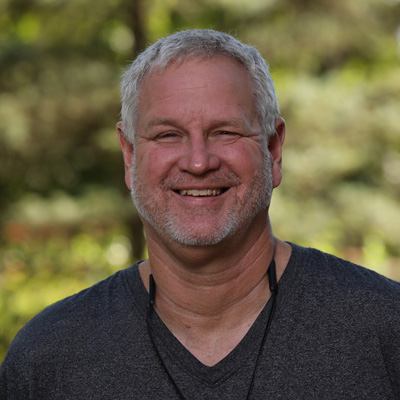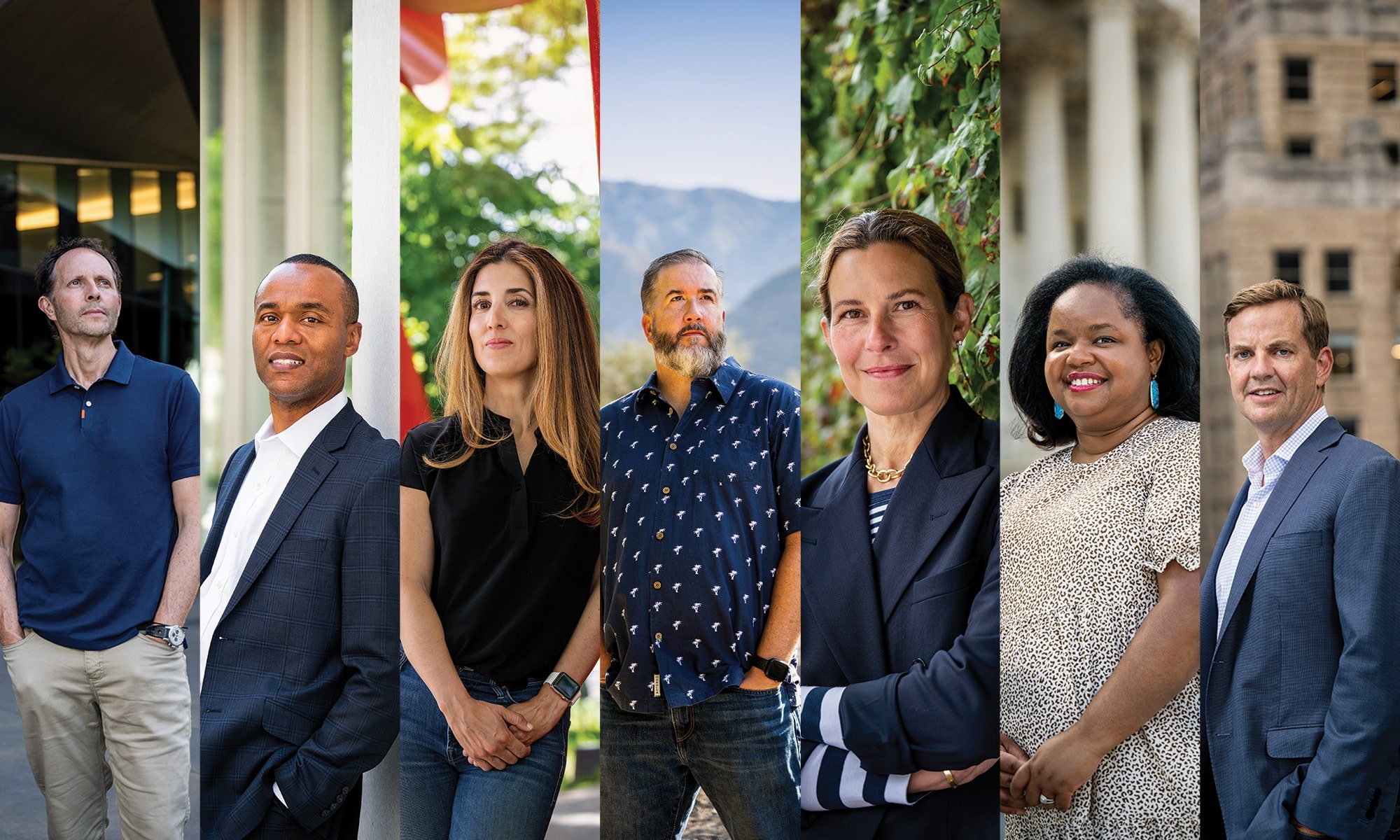Gregory Evans ’97 wasn’t allowing himself to become a modern-day Willy Loman.
In his first semester at Denison, the pre-med major dropped chemistry and was carrying a C-plus in zoology. Sitting in English class and watching the cinematic adaptation of Death of a Salesman, Evans realized he didn’t want to go through life harboring regrets like Loman, the unforgettable protagonist in the Arthur Miller production.
Evans decided to switch academic paths and major in English and cinema.
“I started getting into film, and I would sit down to edit and the hours would disappear,” says Evans, a director and editor who’s worked on such blockbuster projects as Grey’s Anatomy and the Netflix smash Bridgerton. “Something like that never happened to me. I realized it was something I liked and hoped to get good at.”
Evans is one of seven Denison graduates from the 1990s we spoke to about their college experiences. While their backgrounds and professions are varied, each learned lessons in coping with challenges and, in some cases, changing career aspirations during their time at Denison. Most agree that their liberal arts education afforded them a wide base on which to pivot.
In the next few pages, these seven Gen X alums discuss their experiences as well as their favorite campus hangouts, memorable concerts, and the once-fashionable attire they would never wear again.
Including at least one pair of Hammer pants.
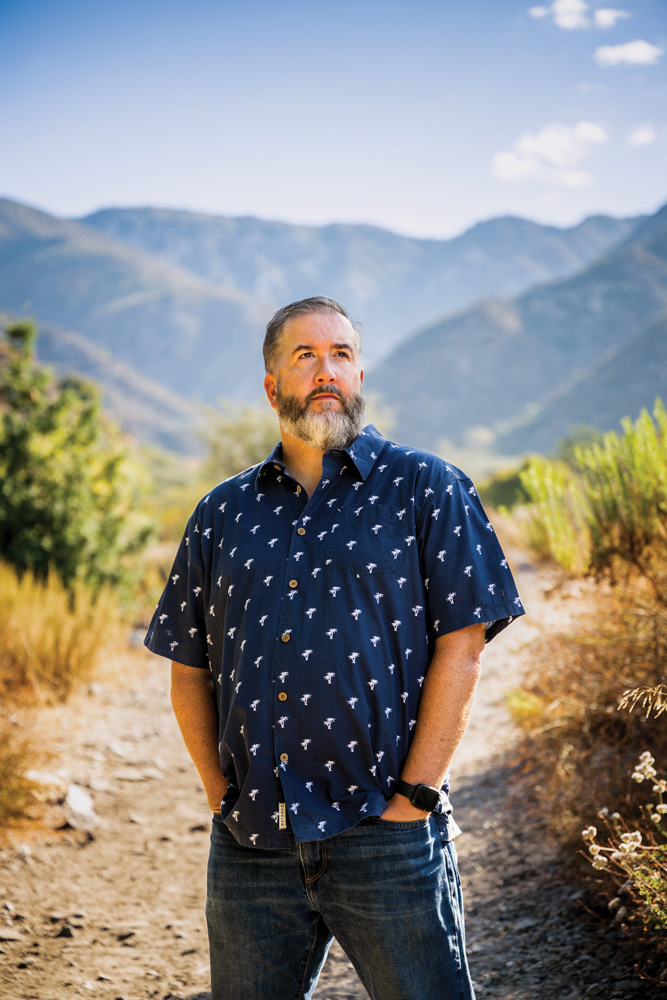
Gregory Evans ’97
Director, Editor
Majors: Cinema, English
How did your Denison experience shape the person you have become?
Getting to Denison and seeing all the equipment and all of the great teaching they had really opened up my world to the possibilities of being a filmmaker and an editor.
Who at Denison most influenced the way you think and learn?
In the English department, Dr. Richard Hood was a big influence because we took a Russian literature class with him. It was just me and two other students and we sat around and talked about what we were reading. It was so personal, and it helped change the way I think about things.
Dr. Dave Bussan in the film department taught me a lot about the way a story is told. He also taught me that how you shoot something and edit it really affects the story. He was a real inspiration.
How did you learn from failures at Denison?
When you go out to shoot a movie, what you shoot is not always what you get. It’s not exactly what you wanted. Every time that happens you learn. You also learn how to fix the problem. That’s what I learned working on projects at Denison, which paid off for me now as an editor.
How does your liberal arts education influence your daily and professional life?
It really helps for the creative process to be able to draw on things and be able to be well-rounded. Everyone has different places they are coming from, and to be able to have a little bit of the pie in a lot of different areas is huge.
Where did you hang out or spend most of your time at Denison?
I spent most of my time at the cinema annex working on projects and films and studies.
What were you watching and listening to while you were in school?
I remember watching Pulp Fiction a lot. I think I had an illegal copy of it, and I think we watched it in my dorm room every day. People would come over and watch it.
I also watched a lot of Martin Scorsese movies looking for inspiration. Music wise, Dave Matthews was big. He came to campus to play my junior or senior year.
What were you wearing back in the day that you would never be caught dead wearing today?
Some of it’s coming back. My kids are wearing my wife’s clothes from the 90s. I wore flannels all the time. It didn’t matter what season. I wore a beret-style hat, and that got retired as soon as I left Denison.
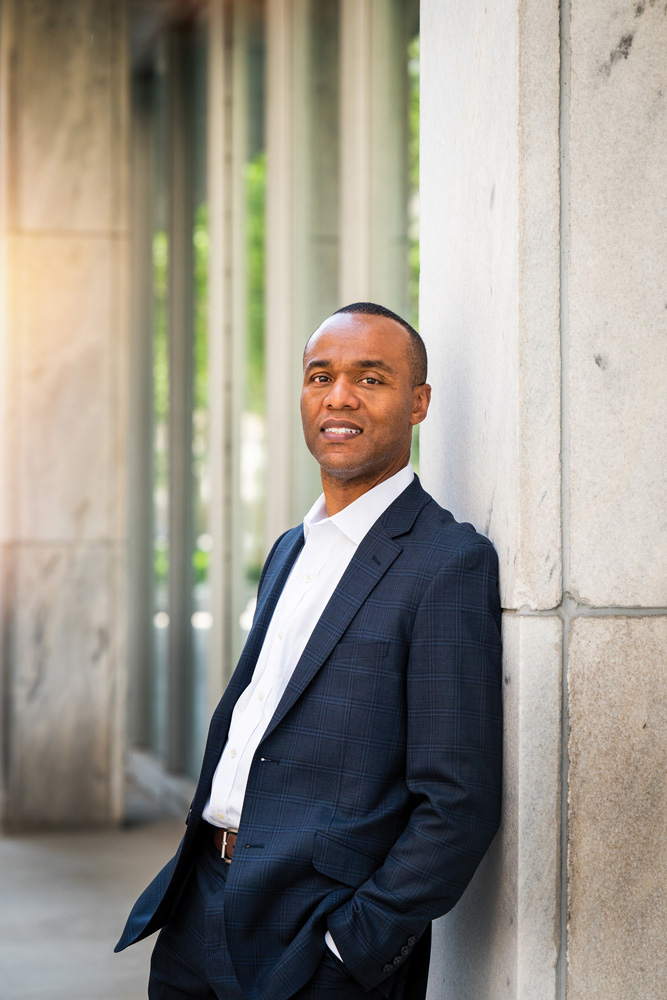
Oyauma Garrison ’96
Maryhaven President, CEO
Major: Communication
How did your Denison experience shape the person you have become?
Denison shaped me in so many ways. It gave me perspective on how the world operates, but in a microcosm sort of environment. It provided me with a diversity of experience and thought. Challenges relative to critical thinking. Problem solving. Interpersonal skills. It gave me a chance to test and validate life in general. It prepared me with an incredible network of friends that I call family today.
Those four years gave me an opportunity to discover who I am and to lean into my strengths and to go proudly and boldly into the world and do what I believe is my passion and purpose.
Who at Denison most influenced the way you think and learn?
There are several, but if I had to narrow it down, I’d pick Dr. Betty Lovelace. She represented the university with the utmost highest standards. Dr. Lovelace found creative ways for students of color to actively engage in campus culture. She encouraged us to participate on a macro level and helped us feel comfortable and ensure we were seen and heard. She influenced us to do whatever we can to make people feel invited, to feel comfortable and to feel a part of the ecosystem. For me, that went into how I viewed my world and corporate America. When I brought in new employees, I wanted to make sure they felt invited into the culture.
How did you learn from failures at Denison?
My first failure at Denison came in my first three weeks on campus. Dr. Evans was the chemistry professor, and by the time we got to week three, he was on chapter 12 and I was still on chapter 2. I went graciously to him and said, “I need you to sign this slip because I have to get out of this class.” It’s hilarious because to this day, he has no idea the path that he put me on. I was hellbent on pre-med. I was great in science in high school, but man did it change dramatically in college.
When you started at Denison, what did you see yourself becoming?
When I started at Denison, I pictured myself becoming a medical doctor. What I ended up becoming over those four years was more of a business and political person. I enjoyed the business side of the world, but I also enjoyed the impact community leaders could have. I started in the business arena and now I serve in a nonprofit and continue to move more into that community leadership space. I have the honor and privilege of serving as the CEO of Maryhaven (central Ohio’s largest and most comprehensive behavioral health services provider specializing in addiction recovery). All of my on-campus organization involvement, leadership roles, and impact prepared me for continued involvement in community/nonprofit work in order to make a meaningful difference.
How does your liberal arts education influence your daily and professional life?
It affords me a very open mind. I can lean in and connect with people on a number of different levels, and it helps me to flex disciplines. Whether it’s finance or development, strategic planning or leadership, public speaking or writing grants, I can go as far as I need to and still be able to connect with others.
What were you watching and listening to while you were in school?
On TV, it was In Living Color and Martin. Music wise it was R&B and hip-hop. Prince was still No.1 for me.
What were you wearing back in the day that you would never be caught dead wearing today?
Oh my gosh, we used to wear the MC Hammer pants. Today, that’s a no.
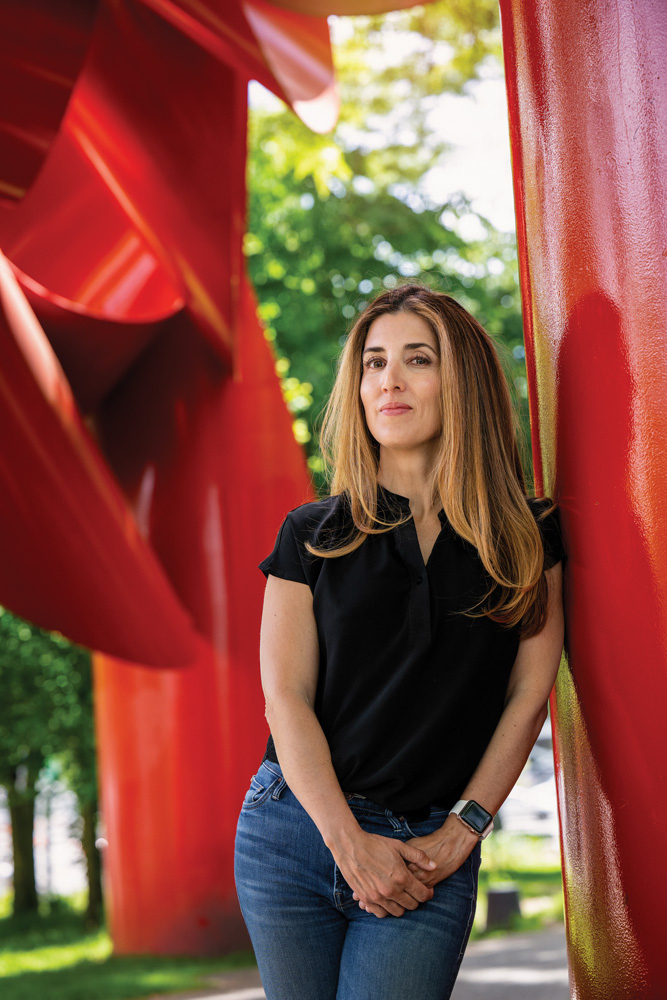
Maria Hess ’94
Amazon Web Services, Head of Startup Programs
Major: Communication
How did your Denison experience shape the person you have become?
It helped form my appreciation for the diverse and unique attributes of others and a willingness to try a lot of different things. It also helped me build a foundation as a strong writer and a love of performing arts, adventure, and growth. Since graduation, I’ve become a tech executive, startup builder, venture investor, and a mom of three.
Who at Denison Most influenced the way you think and learn?
There are two people that come to mind. Keith Ward was my piano professor and advisor. He encouraged and challenged me in a variety of ways. My aunt Anne Powell Riley ’53, who’s a major donor and alumni citation recipient, inspired me through her love of travel and stewardship of the environment.
How did you learn from failures at Denison?
I’ve come to realize that I learn more from my failures than my successes. At Denison, I felt it was more important to develop understanding and insights from the material even if my grade didn’t (yet) reflect that mastery.
When you started at Denison, what did you see yourself becoming?
I didn’t really know what I wanted to do when I started at Denison, and I felt like it was an opportunity to try things on for size — from pre-med to performing arts. I chose things I enjoyed while building skills that I thought would be valued after graduation.
How does your liberal arts education influence your daily and professional life?
The writing and listening skills, friendships, and network were important foundations for my career. Listening and curiosity are particularly important in the tech and startup industry. Customer obsession and being able to understand customers’ challenges and needs are critical to knowing what solutions to build or invest in and forming a point of view with meaningful insights.
Where did you spend most of your time at Denison?
I spent a lot of time in the music and dance buildings, practicing piano as a music minor and participating in dance classes and performances.
What were you watching and listening to?
For TV, Growing Pains, Frazier, and Seinfeld. I was into music from the Spice Girls, TLC, The Samples, Blues Traveler, Big Head Todd, and Rusted Root.
What were you wearing back in the day that you would never be caught dead wearing today?
I won’t say never when it comes to fashion because it all seems to come back in some format. Back then, I might have been found in shoulder pads and big bangs.
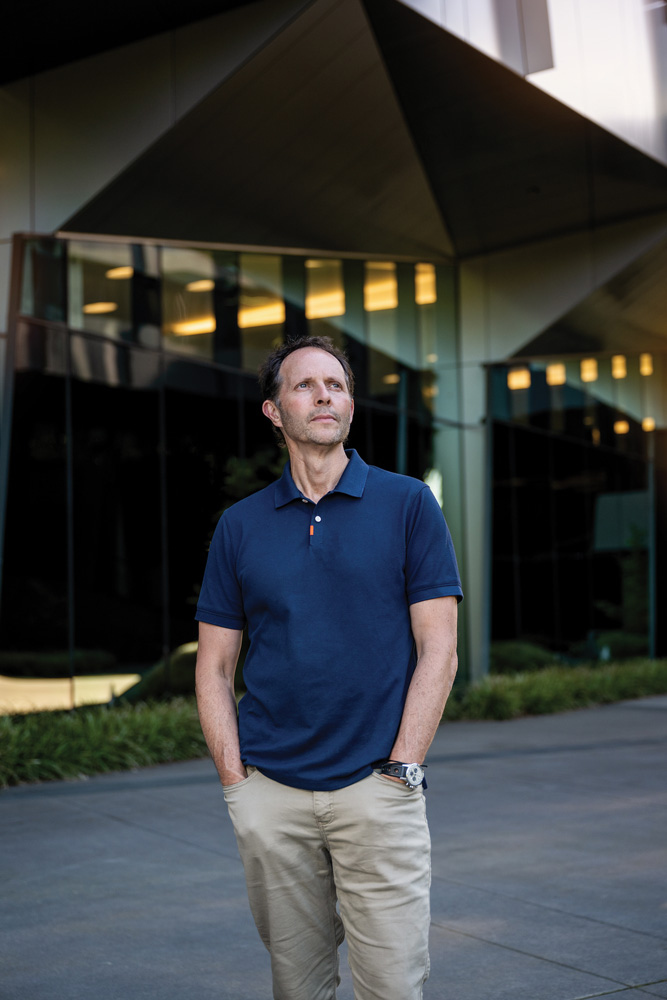
Jim Reynolds ’90
Vice President, Global – Nike Marketplace Partners
Majors: English, Economics
When you started at Denison, what did you see yourself becoming?
I saw myself working in business and some leadership role. The thing 30 years on, what I hadn’t realized when I started, was how important it was going to be for me to always be doing something that I believed in and something bigger than myself. Looking back, it’s not transactional. I’ve been in business to be part of things I believe in, and that’s been a wellspring of energy and inspiration throughout my career.
How did your Denison experience shape the person you have become?
Denison taught me to learn how to learn. I’ve worked in six different functions in my career and 10 different countries. I’m usually doing something I don’t precisely know how to do. That’s been the case most of my career, and it’s worked out pretty well.
Denison also helped breed some humility, and that’s really important. The combination of confidence and humility has been crucial to me in the way I go through life. The absence of humility is a killer.
Where did you hang out or spend most of your time at Denison?
I was in the gym a lot and also my fraternity. I played club lacrosse, and I also spent a lot of time at Slayter Hall.
What were you watching and listening to while you were in school?
I never watched TV. That wasn’t part of my experience. I feel like when R.E.M. showed up, we had the music of our generation.
Who at Denison most influenced the way you think and learn?
Dick Lucier was the head of the econ department, and I majored in English and economics, and he had a profound impact on me. Gill Miller was a dance professor who I had nothing in common with, but she had a huge impact as someone who’s different than me. She took an interest and challenged me.
The promise of a place like Denison is you will be challenged by people who are on your side. They challenge you from a place of goodness and belief in you — and that was Gill Miller.
How did you learn from failures at Denison?
My biggest leadership failure of my life happened at Denison, and it came in the context of my fraternity. It’s a lesson that’s been with me forever. What I came to realize is I was unconsciously oriented more toward pleasing the bosses than I was to serving the team. It should always be about the team first.
How does your liberal arts education influence your daily and professional life?
Denison taught me to thrive in ambiguity. It taught me to bring clarity and strategy to ambiguous spaces. A liberal arts education did a lot of that without me knowing it. It prepared me to step into a variety of different spaces and not only be able to comprehend the space but connect the space to something bigger.
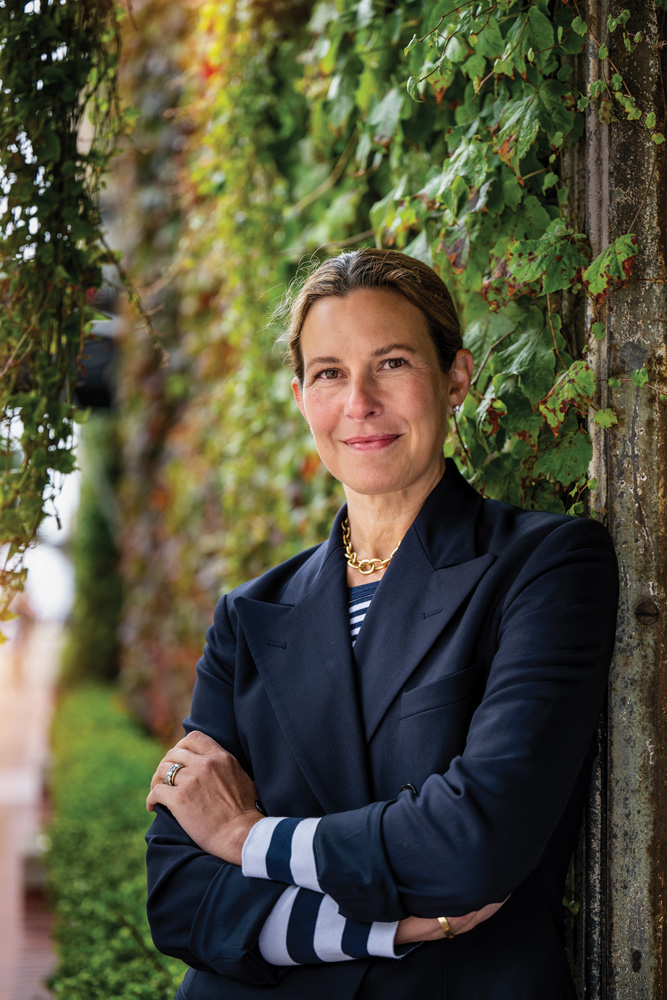
Erin Dempsey Lowenberg ’93
Senior Vice President, Rothy’s
Major: History
When you started at Denison, what did you see yourself becoming?
I started my Denison career thinking I was a pathologist. I was fascinated by all things medical. That lasted about a year.
What I realized was the need to pick courses and subjects I enjoyed deeply. My goal was to figure out how to learn. I graduated as a history major, but I ended up in design and retail. It was a strange, circuitous route.
But it taught me the lesson that I didn’t know as much about myself as I thought when I started at Denison. And that’s OK.
How did your Denison experience shape the person you have become?
I have incredibly long-lasting relationships, and I know that’s probably true with lots of schools, but I think there’s truly something magical about Denison’s enduring friendships. I married a guy from Denison (John Lowenberg Jr. ’93). My friend group is intensely Denison focused. These are the people I resonate the most with. They are smart, loyal, caring, funny, and have done interesting things. Those friendships have transcended a very small school in the middle of Ohio.
Where did you hang out or spend most of your time at Denison?
I loved the ’Villa, sorry. True story. I spent a ton of time at King Hall in my junior year and that entire quad by the tiny theater. It was fun to be outside there. I also loved being in the library, which I know is the dorkiest thing ever, but I liked being in the music listening room and listening to classical music. It was the 1990s, and nobody had Spotify, playlists, or Apple anything.
Who is the person at Denison who influenced the way you think and learn?
Dr. Amy Gordon. I had a seminar course with her during my junior year. There were six of us sitting around a table in a very deep and intensive history course. She really gave me some intellectual and academic confidence.
How does your liberal arts education influence your daily and professional life?
Liberal arts educations are for lifetime learners. Whether focusing on something that’s deeply important, or ambiguous, or trying something new, my Denison education gave me confidence in myself as a learner. I’ve tried out new things in my career and am always open to challenges. That’s the beauty of a liberal arts education. I was able to test all the boundaries of what I wanted to explore, and I could do it with confidence and alacrity, even if I failed at times. There were subjects I knew nothing about, and I would say, “I’m going to dig in and figure it out.”
I’ve kept that growth mindset through my whole career. I’ve never shied away from the unknown. For me, Denison taught me about myself and my learning style. I have relied on it for life.
What were you watching and listening to while you were in school?
I honestly didn’t watch a lot of TV, maybe a bit of Golden Girls and 90210. My time at Denison was kind of unplugged. I equate my Denison years in terms of music to The Samples and the Freddy Jones Band. Those two bands make me think of Denison.
What were you wearing back in the day that you would never be caught dead wearing today?
I had a perm in my first year. It took the whole year to grow out. I wear the memory with pride, but I wish I knew why I thought the perm was a good idea.
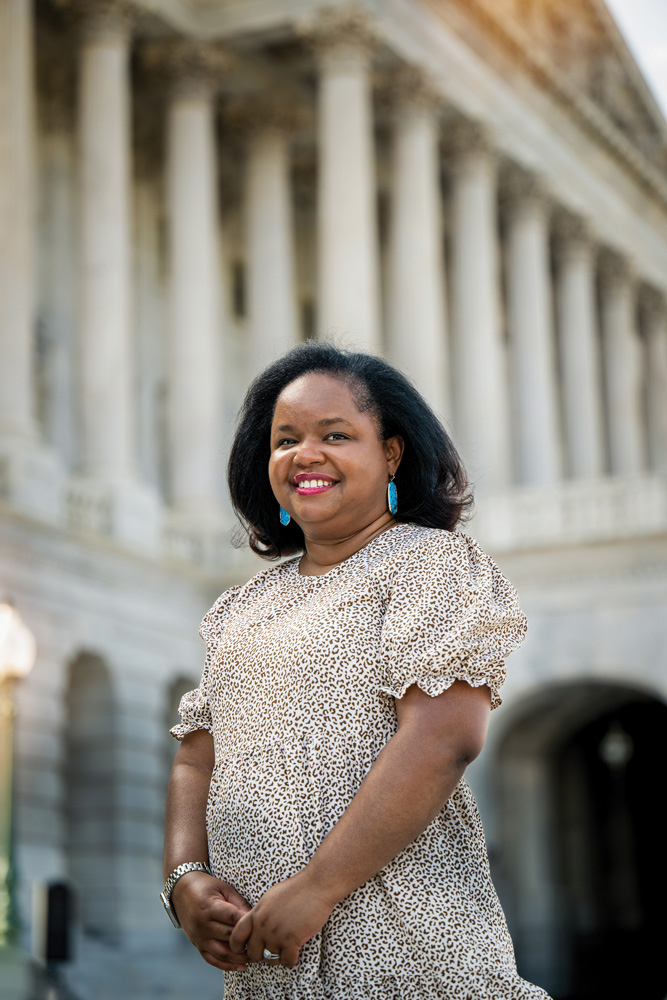
Crystal Roberts Jezierski ’94
Senior Managing Director, Guidepost Solutions
Major: History
How did your Denison experience shape the person you have become?
When I was there, we used to always say Denison was a very social school. You can take that many different ways, but it was very much the act of relating to other people, which was a big part of being at that school. I consider myself an introvert, but I enjoyed my time at Denison. It really got me comfortable in my own skin, and it allowed me to grow in what I considered a safe place, a place that was very open and welcoming.
Who is the person at Denison who influenced the way you think and learn?
The professor I remember the most was professor Emmett H. Buell Jr. in political science. I was someone who was already interested in policy and policy making. The way he helped me engage in his classes, it grabbed me.
How did you learn from failures at Denison?
There’s nothing particular, but what I learned while I was there was that tomorrow is a new day. You put a bad day behind you and you get up and go again. It was a positive feeling of letting go of the past and getting ready for the next day. It goes back to what I was saying about Denison being a safe space. It helped you develop fortitude. That’s definitely something that’s helped me in my post-Denison days.
When you started at Denison, what did you see yourself becoming?
To be honest, that experience happened to me in high school when I thought I wanted to go to medical school and become a doctor. It was AP chemistry. I was like, “No, this isn’t for me.” Once I got to college, I kind of knew what I wanted to do. I had a good feeling that I would go to law school. For me, Denison was as much about the personal growth as it was the academic growth.
How does your liberal arts education influence your daily and professional life?
It helped teach me to think for myself. I’m not saying you have to go to a liberal arts school to think that way, but at Denison, it’s almost like you take a step back and you kind of look at everything in front of you and see how all these aspects of humanity come together. I think that’s important now more than ever. Take innovation — the best innovators are people who understand how humanity will want to live and need to live in 50 years.
Where did you hang out or spend most of your time at Denison?
My non-classroom time was spent either hanging out with my friends in their dorm rooms or, because I was in a sorority, at the Row at one of the parties or at Slayter Hall.
What were you watching and listening to while you were in school?
I really didn’t watch a lot of TV at that time. I liked the movie Singles. I was a classic rock person. Probably the Eagles.
What were you wearing back in the day that you would never be caught dead wearing today?
I have a creative streak, and even back then I wore some unique jewelry. Other than that, I was a pretty conservative dresser.
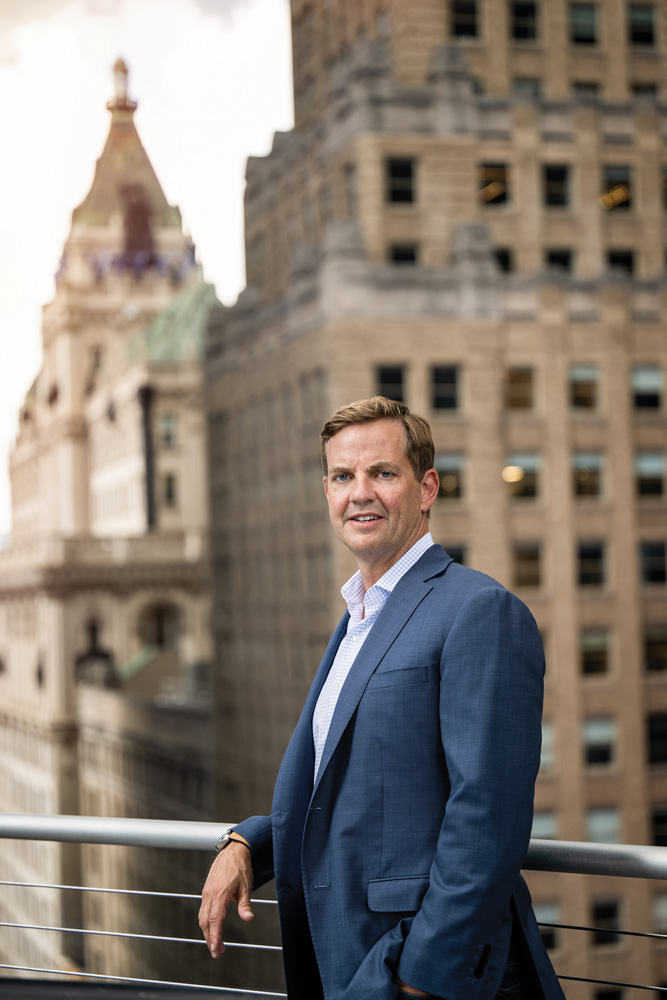
Nelson Griggs ’93
Nasdaq Stock Exchange president
Major: Political science
How did your Denison experience shape the person you have become?
I think liberal arts, and especially Denison, help prepare you for all the unpredictability in life. The flexible nature of the education allows you to be more adaptable to all of life’s unforeseen challenges.
How did you learn from failures at Denison?
Denison teaches you resiliency. When you are young, setbacks drop you back a mile and you think it’s the end of the world, but Denison does a nice job of building that resiliency muscle that you find ways to adapt. Maybe you don’t realize it when you are first out of school, but as you progress, you understand you were given a foundation at Denison that helps you learn from setbacks and keep moving forward.
When you started at Denison, what did you see yourself becoming?
I went to Denison because I liked the idea that it was going to expose me to a wide variety of things. Did I necessarily see what I’m doing today back then? Absolutely not. But I knew I wanted to do something that involved building relationships and high performing teams, and Denison helps you excel with both. It’s a terrific community with many different personalities.
How does your liberal arts education influence your daily and professional life?
I do sessions with students and I get asked a lot of, “What do you look for most in employees?” And from the younger folks, “How do you grow in a company?” I always end up giving the same answers.
I believe a liberal arts education supports community involvement and risk taking. When I meet with new employees or do sessions with students I often get asked, “What do you look for most in employees? And “how do you grow in a company?” I always point to the same two things that helped me in my career and were supported from my time at Denison.
In addition to excelling at what’s in front of you every day, it is important to support your colleagues without asking anything in return. Managers will see that effort and you will stand out. You want to be supportive of your community. The second thing that helps set you apart is to be willing to always raise your hand for critical assignments and new projects. Whether you succeed or fail, you will learn from the experience and show that you are not afraid to challenge yourself.
What were you watching and listening to while you were in school?
Football was always on, and Shark Week was big for us. So was playing Madden football. Great bands came to campus: Big Head Todd (and the Monsters), The Samples, and I’m pretty sure Phish came. And a shoutout for the Barley Boys.
What were you wearing back in the day that you would never be caught dead wearing today?
Ripped jeans. T-shirts that I wore the day before. Clothes that could use a wash.
